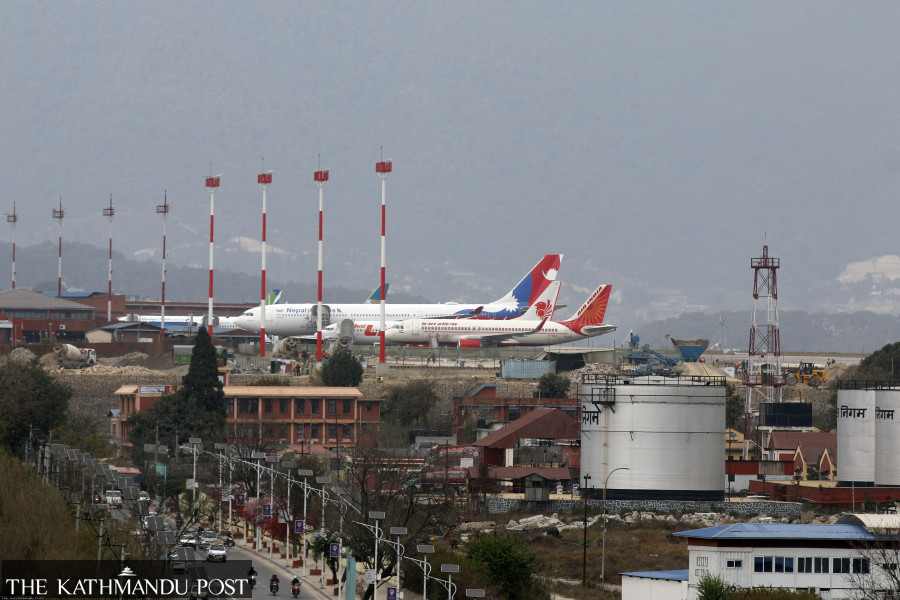
United Nations aviation watchdog International Civil Aviation Organisation has formally asked Nepal to split the civil aviation body into two entities—service provider and regulator. The separation is a crucial organisational reform agenda which has been a work in progress for the last one and a half decades.
ICAO said in its Nepal audit draft report, a copy of which the Post has obtained, that the move was needed to “ensure a clear separation of authority between the service providers, operators and the regulatory authority”.
This is the first time that ICAO, which creates regulations for aviation safety, security and efficiency globally, has clearly written to Nepal to perform the functional separation. ICAO has made this issue a high priority.
This year, a team of 10 auditors from the UN specialised agency audited Nepal’s aviation from April 13 for 10 days. The draft report was sent to the Civil Aviation Authority of Nepal in July for its comments prior to the publication of the full report.
The preliminary report issued in April said Nepal’s performance on organisation, which defines organisational structure needed to meet safety standards, has remained poor. The effective implementation score on organisation has been reduced to 45.45 percent from the earlier 50 percent. The global average is 71.2 percent.
Amid the ongoing developments, newly appointed Tourism and Civil Aviation Minister Jeevan Ram Shrestha said on Sunday that Nepal would not immediately accept the condition the European Commission has put forward to separate Nepal's civil aviation into regulatory and service-providing organisations.
But splitting the Civil Aviation Authority of Nepal is Nepal’s own agenda, not the European Commission’s.
The government first announced the proposal in its Three Year Interim Plan 2007-08 to 2009-10, which stated, “In the context of the completion of the study on the institutional strengthening of the Civil Aviation Authority of Nepal, which has been working as the service provider in civil aviation, airport operator and regulator; implementation of doable recommendations suggested by the report are being considered.”
Since then, every periodic plan and policy, including the annual budget, has accorded priority to separating the civil aviation body. But the plan has never been implemented.
“Obviously, someone has been engaged in foul play from the beginning,” said a retired director general of the Civil Aviation Authority of Nepal. “The bills to separate the organisation have been kept on hold in Parliament. No one knows why,” he said.
“It’s serious. The efforts made over decades to implement effective safety mechanisms in the aviation industry are being foiled by a handful of opportunist people,” said the former aviation chief.
A Tourism Ministry official says Minister Shrestha’s statement violates all the commitments Nepal has made at different national and international forums, including the directives of Nepal’s Parliament. Different laws also require Nepal to break up the aviation regulator with a clear demarcation of its powers and responsibilities because its dual functions gave rise to a conflict of interest.
Speaking at the Civil Aviation Authority of Nepal on Sunday, Shrestha said Nepal has got good marks in the ICAO audit. “But it is surprising that Nepal is listed in the European Commission air safety list,” he said.
"The bill on Nepal's civil aviation is in Parliament and we will separate the authority into two organisations according to need and at the appropriate time,” he told the press meet.
“So, when is the appropriate time?” said another former director general who wished to remain unnamed.

In December 2013, the European Commission imposed a blanket ban on Nepali airlines from flying into the 27-nation bloc after the September 2012 crash of Sita Air Flight 601 at the Manohara river near Kathmandu airport. Post File Photo
One and a half decades have passed since Nepal decided to split up the civil aviation body as the plan kept running into roadblocks.
Minister Shrestha, however, appeared to be oblivious to the need to split the civil aviation body.
“We are discussing whether separating the civil aviation body is today’s need or not,” Shrestha told the Post. “Many countries have not done this,” he said. “It’s our internal matter.”
Some officials say that the bill will be null and void if not passed before the elections.
Insiders say the bills are now in uncertain territory.
These two long-pending aviation bills, whose passage would have hastened the removal of Nepal from the European Commission's air safety list, encountered another setback in March when the then tourism minister Prem Bahadur Ale stopped them from being tabled in the lower house for discussion.
On March 1, the Parliament Secretariat had included the two aviation bills on the agenda for a meeting of the lower house scheduled for March 2.
The proposed pieces of legislation were put on the lower house agenda, and it was done in consultation with the government, Gopal Nath Yogi, secretary at the House of Representatives, had told the Post in a reference to the Tourism and Law ministries.
But on March 2, Ale suddenly requested the Parliament Secretariat to hold back the bills, explaining that some employees of the aviation regulator were opposed to the planned fragmentation of their office.
Parliament was subsequently prorogued, and the proposed pieces of legislation were once again put in deep storage.
Two weeks later, on March 15, President Bidya Devi Bhandari prorogued the session of the federal parliament. On May 17, a new session of Parliament started, but since the resumption of the House, there has been no sign that the bills will be discussed, insiders say.
The two bills sailed through the National Assembly. On August 2, 2021, the upper house unanimously passed them, five months after they were registered.
Insiders say there is larger politics to prevent the bills from being passed into law. They say that once the civil aviation body is separated, some top position holders will lose the dual benefits they have been receiving.
The existing system allows the Civil Aviation Authority of Nepal’s director general to issue tenders for multi-billion-dollar projects. The same person also has the plum job of overseeing compliance with the project and the aviation regulations governing the issuance of licences to airlines and crews.
“No one wants to lose this scope and power. That’s why, despite intense pressure, it has become hard to separate the civil aviation body for a long time,” Rameshwar Thapa, president of the Airlines Operators Association of Nepal, told the Post in a recent interview.
After the Three Year Interim Plan of 2007, successive governments have included the plan to end the dual functioning of the aviation regulator.
In 2010, Nepal signed a loan agreement with the Asian Development Bank to fund different airport projects after Nepal made a commitment to separating the civil aviation body into service provider and regulator.
In October 2018, a sub-committee of the parliamentary International Relations Committee led by former prime minister Madhav Kumar Nepal directed the government to immediately split the aviation body saying it was a “mandatory requirement.”
The sub-committee report says that Nepal’s aviation industry is facing problems at the national and international levels due to the delay in the separation. The panel had directed the government to pass the civil aviation bills immediately.
Shrestha, the current aviation minister, comes from Madhav Nepal’s party.

One and a half decades have passed since Nepal decided to split up the civil aviation body as the plan kept running into roadblocks. Post File Photo
The budget for the current fiscal year also states, “separate entities will be set up as service providers and regulators by restructuring the Civil Aviation Authority of Nepal”.
Insiders wonder what prompted Minister Shrestha to say the proposed separation was a condition of the European Commission.
They said that former minister Ale and the incumbent Minister Shrestha both are members of the CPN (Unified Socialist), a coalition partner of the Sher Bahadur Deuba-led administration, and their chairman is Madhav Nepal.
“I smell a rat here,” said an official at the Tourism Ministry. “It looks like the present government will not pass the bills. And obviously, there could be some shady deals, otherwise, there is no reason to stop such crucial bills from being passed.”
Sanjiv Gautam, former director general of the Civil Aviation Authority of Nepal, said, “There is a lack of political commitment. The separation was decided before the European Commission put Nepal on its air safety list. There is no pressure from any international agency because the plan was first mooted by the Nepal government in 2007. It was the country’s need to ensure safety.”
Every successive tourism minister and political leaders have been constantly pledging to the diplomatic community that Nepal will pass the bills and start the process to have the country removed from the bad books of the European Commission.
In December 2013, the European Commission imposed a blanket ban on Nepali airlines from flying into the 27-nation bloc after the September 2012 crash of Sita Air Flight 601 at the Manohara river near Kathmandu airport. Nineteen people, including seven British citizens, died in the disaster.
The commission became more concerned after that fatal crash, and it prevented airlines from Nepal from entering the continent as the country reported a spate of air accidents over the years.
Between 2008 and 2012, there were at least two crashes a year in Nepal. The European Union, since then, has been watching Nepal’s air safety development process closely.
But Nepali politicians are least bothered. They keep making commitments but do nothing to fulfil them, insiders say.
In an interview with the Post, EU Ambassador to Nepal Nona Deprez said, “Nepal has to ensure that there is a distinct separation of responsibilities between the Civil Aviation Authority of Nepal (CAAN) and the aviation industry/service providers.”













